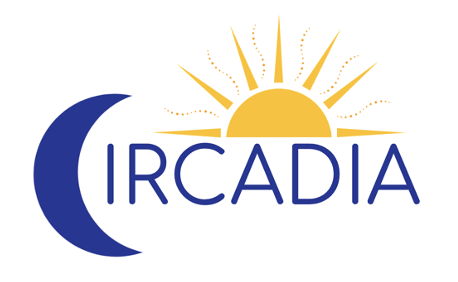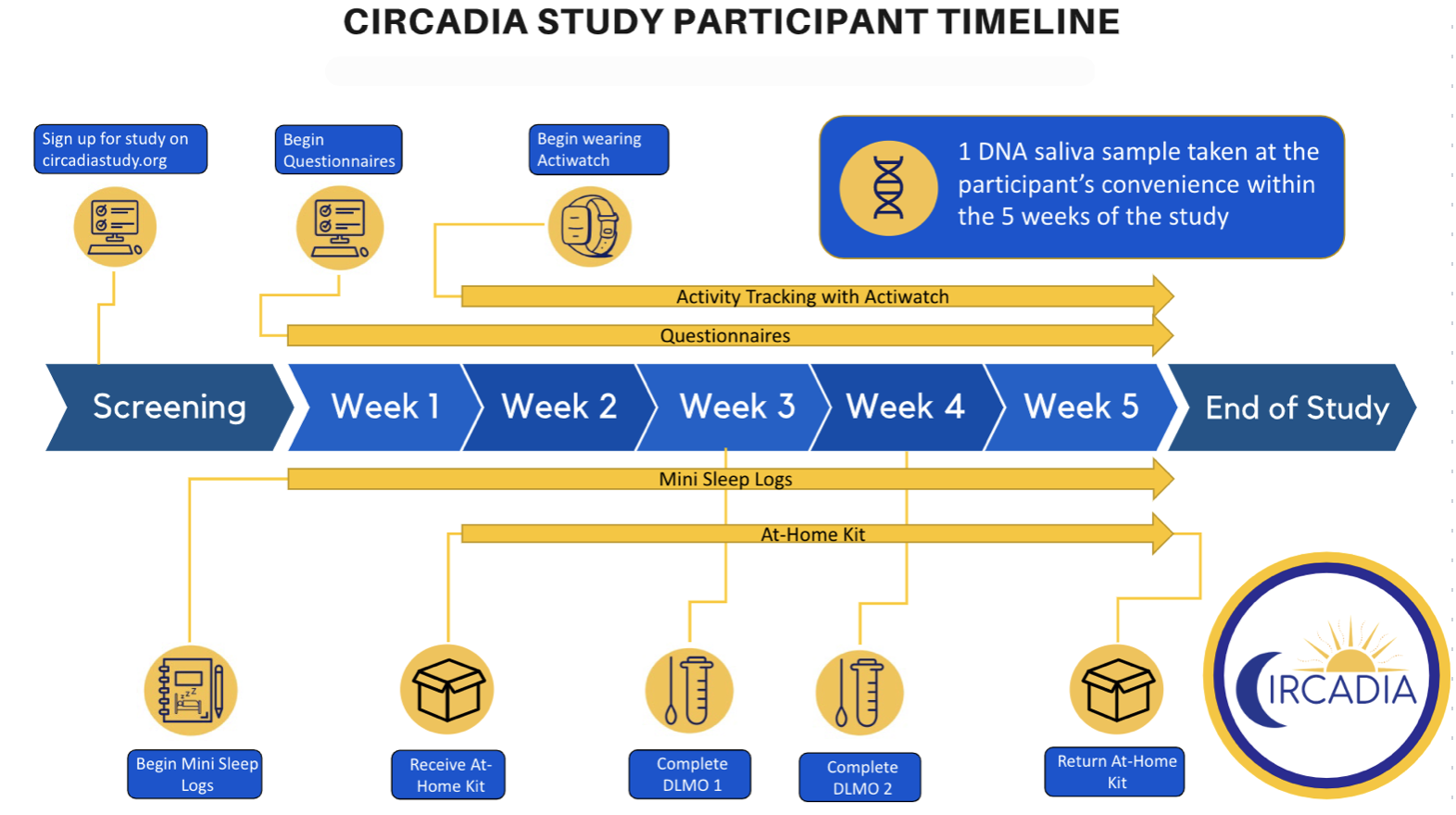
We are looking for people living with circadian rhythm disorders to join our completely remote, at-home study.
The Circadia research study is focused on better understanding the genetics of circadian rhythm disorders. Circadian rhythms are an integral part of our functioning, regulating and syncing our human behavior and physiology with the external environment and the 24-hour day. While research has been able to identify core components of our molecular circadian clock, much is still unknown about the genetics and physiological mechanisms driving our circadian rhythms.
Partnering with individuals in the atypical circadian rhythm community, we plan to uncover the genetic basis of circadian rhythms. With your help, we can use our findings to improve health outcomes for people with atypical circadian rhythms.
To participate in this study you will first need to complete our online screening questionnaire. The online screening questionnaire will allow us to check that you are eligible to participate in the Circadia research study. To complete the questionnaire, please use the Sign-Up button located at the top right of the screen.
Study Duration: Approximately 4-6 weeks
Monetary Compensation: Up to $480
Activities: Sleep logging, answering questionnaires, wearing a watch that tracks sleep and light input patterns, and completing 2 dim light melatonin assays saliva samples, 1 DNA saliva sample. All study materials are provided.
- Diagnosed with Delayed Sleep Phase Disorder or Advanced Sleep Phase Disorder
- Sighted, non-college students aged 23 years and older
- Non-pregnant participants that have not given birth in the past year
- Individuals not taking medications that inhibit melatonin production
- Individuals that have not suffered traumatic brain injury, a stroke, or live with a seizure disorder
- Individuals that do not have gingivitis, xerostomia, or periodontitis
- Individuals that read and write English at an 8th grade level and above
- College Students
- Adolescents
- Pregnant Women/ those who have given birth in the last year
- Individuals taking medications that inhibit melatonin production
- Individuals who have suffered a traumatic brain injury, stroke, or frequently experience seizures
- Individuals who have gingivitis, xerostomia, or periodontitis

If your question is not answered below, you can call or email our study staff at 1 (857) 265-6742 or circadiastudy@bwh.harvard.edu.
The study takes approximately 6 weeks to complete. It’s home based and self-directed, meaning you can fit it to your schedule and complete from the comfort of your home, without needing to visit our research office.
For the Circadia study we will ask you to fill out questionnaires, provide a saliva DNA sample, wear a wrist activity monitor (similar to a Fitbit), keep daily sleep and food logs, and collect saliva samples in dim light. There is also an optional blood draw that can be scheduled if you are local to the New England region and are interested in providing the blood draw.
Upon completion of the study, you will be compensated up to $480
Yes, at this time you do need to be diagnosed with an atypical circadian rhythm or circadian rhythm disorder in order to participate in this study.
Unfortunately, part-time students are not eligible to join.
There are no direct benefits to you as an individual. However, we will return your dim light melatonin onset results and your food logging in the form of a report. These will provide you with insight into your natural bedtime, sleep habits, morning/evening preference, and diet. You will also receive updates on the study via a newsletter. You will help contribute to research within an understudied population. We hope this study will help us better understand atypical circadian rhythms. Specifically, whether there are changes in genes. These changes in genes may be linked or lead to atypical circadian rhythms. This knowledge may help us find therapies and better diagnostics for atypical circadian rhythms.
The risks associated with this study are minimal and can include: sleep loss, gum sensitivity, skin irritation from wearable technology, side effects due to refraining from certain substances (alcohol, nicotine, caffeine, recreational drugs, certain foods, and/or melatonin), loss of confidentiality, and risks from the optional blood draw.
One of our study goals is to make this study as accessible as possible. We will provide a smartphone on which you will access our online portal and complete your sleep and food logs. The smartphone will be the main source of study communication during the at-home portion of the study. Prior to receiving the at-home kit, which includes the study smartphone, you will need to complete the screening questionnaires, consent and enrollment, and some study tasks from your own electronic device. This will require you having access to either data or Wi-fi sources, and access to a web browser, to access the study website, materials, and tasks. You will NOT need to download any applications onto your own personal device. Once you have received the at-home study kit, we will ask you to use the study smartphone to complete study tasks. You will need access to local wi-fi networks to use the study smartphone.
We recognize that not everyone has access to a reliable wi-fi source, or personal electronic device. If you believe this may be an issue for you, please still sign up! We will work to provide you with necessary accommodations to ensure your full participation. Please contact us if you require additional accommodations.
We will use your DNA sample to look for genes that may be linked to atypical circadian rhythms. The questionnaires and dim light saliva collection provide us with background information about your lifestyle and give context to your DNA sample.
You will be assigned a study number and your data will be coded with this number. Your personal information and any study related information will be kept confidential and secured in a HIPPA compliant database. All information will be deidentified.
Of course! Please sign up for the newsletter through the study website: https://tinyurl.com/circadia24
We’d be happy to answer any further questions or concerns that you may have about this study. Feel free to email us at circadiastudy@bwh.harvard.edu or call us at +1 (857) 265-6742 or +1 (857) 523-5547.
Dr. Jacqueline Lane, PhD, is the person in charge of this research study. You can email her at jmlane@bwh.harvard.edu.
The Circadia research study uses unencrypted email messages. Unencrypted email messages are not secure and could result in the unauthorized use or disclosure of your information. If you want to receive communications by unencrypted email despite these risks, Partners HealthCare will not be held responsible. Your preference to receive unencrypted email will apply to emails sent from this research group/study only.